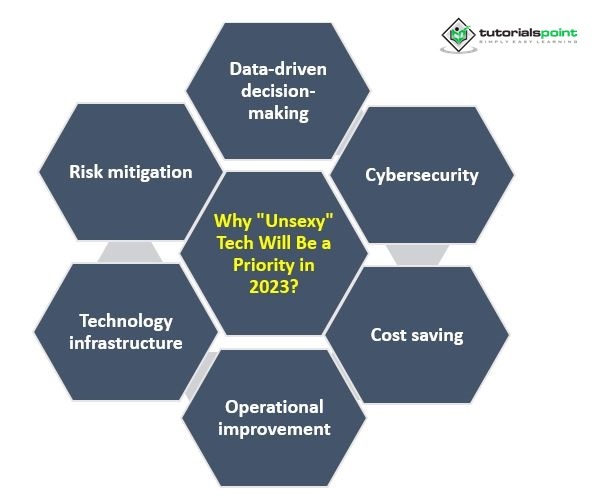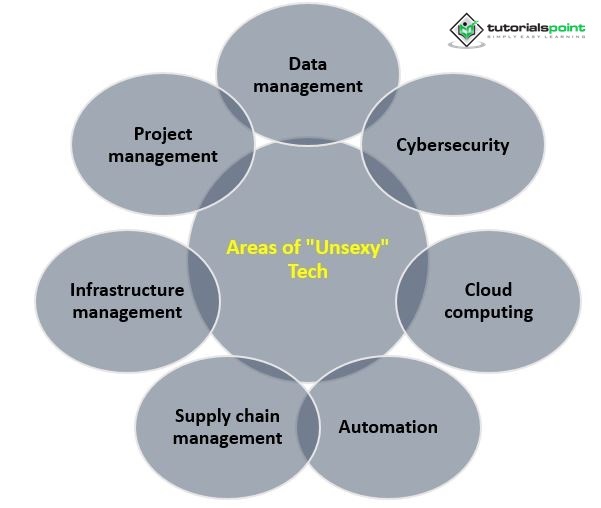

In 2023, "unsexy" tech is expected to be a priority, as these technologies often address fundamental business needs and provide tangible operational improvements and cost savings. Examples of "unsexy" tech include areas like data management, cybersecurity, infrastructure, and supply chain optimization. With companies becoming more data-driven and reliant on technology, the need for solid and reliable technical foundations will become increasingly important. Additionally, companies will look for ways to streamline their operations, reduce costs, and increase efficiency.

"Unsexy" tech refers to technological solutions that are not glamorous or attention-grabbing but are critical for the smooth functioning and efficiency of businesses. These technologies are often behind the scenes, serving as the infrastructure and backbone of operations, but they are essential for enabling innovation and growth. Examples of "unsexy" tech include data management, cybersecurity, cloud computing, automation, and supply chain management. These technologies are not typically seen as exciting or cutting-edge, but they play a crucial role in enabling organisations to achieve their goals.
Following are some of the prime reason

Data-driven decision-making − Companies are becoming increasingly reliant on data to inform their decision-making, which requires reliable and secure technology for data management and analysis.
Cybersecurity − With the increasing number of cyber threats, companies need to prioritize cybersecurity to protect their sensitive information and intellectual property.
Cost savings − By streamlining operations and reducing inefficiencies, "unsexy" tech can help companies achieve cost savings and increase profitability.
Operational improvement − These technologies can improve various business processes, such as automation and supply chain optimization, resulting in more efficient and effective operations.
Technology infrastructure − A solid technology infrastructure is necessary to support the development and deployment of new and innovative technologies.
Risk mitigation − Implementing "unsexy" tech can help companies mitigate risk and ensure business continuity in case of any disruptions.
Overall, the importance of "unsexy" tech will only continue to grow as companies become more technology-dependent and seek to improve their operations and competitiveness.

Data management − This involves organizing, storing, and securing data to support data-driven decision-making.
Cybersecurity − Measures and systems to protect against cyber threats and protect sensitive information.
Cloud computing − It is the delivery of computing resources via the internet to facilitate remote work and data storage.
Automation − The use of technology to automate repetitive tasks and increase efficiency.
Supply chain management − The coordination and optimization of the flow of goods, information, and services in a supply chain
Infrastructure management − The maintenance and management of technology infrastructure, including servers, storage, and networking
Project management − The application of knowledge, skills, tools, and techniques to project activities to meet project requirements
These areas of "unsexy" tech often serve as the foundation for enabling innovation and growth, and their importance is expected to continue to grow in the coming years.
In a scenario where different brands are competing in the market, the implementation of "unsexy" technology can provide a significant advantage for those brands that prioritise these technologies. For example, a brand that has a robust data management system will be able to make more informed and accurate decisions, which can lead to increased competitiveness.
A brand with a strong cybersecurity posture will be better equipped to protect its sensitive information and intellectual property. By automating certain processes and optimising their supply chains, brands can reduce costs and increase efficiency, which can provide a competitive advantage in terms of profitability and operational agility. In short, the effective use of "unsexy" tech can give brands a strategic edge in a competitive market.
Here are a few examples of how different fashion brands have utilized "unsexy" tech to gain a competitive advantage
Zara, the fast-fashion retailer, has embraced "unsexy" technology to gain a competitive advantage in the fashion industry. The brand has invested in automation and data management to quickly respond to changing trends and customer preferences, allowing them to stay ahead of the competition. By using these technologies, Zara has been able to efficiently manage their inventory, streamline their operations, and improve customer satisfaction. These investments in "unsexy" tech have helped Zara maintain their position as a leader in the fast-fashion retail industry.
Nike, the sports apparel brand, has leveraged "unsexy" technology to improve their operations and increase their competitiveness. The brand has implemented supply chain optimization to reduce lead times and increase efficiency, allowing them to quickly bring new products to market. Nike has also invested in data management and analytics to track customer behaviour and preferences, allowing them to personalise their offerings and improve customer satisfaction. These investments in "unsexy" tech have helped Nike maintain its position as a leader in the sports apparel industry and continue to grow its business.
H&M, the fashion retailer, has leveraged "unsexy" technology to gain a competitive advantage in their industry. Data management and analytics have been used by the brand to track customer behaviour and preferences, allowing them to personalise their offerings and improve customer satisfaction. By focusing on these technologies, H&M has been able to increase efficiency, reduce costs, and stay ahead of the competition. These investments in "unsexy" tech have helped H&M maintain its position as a leader in the fashion retail industry.
Gucci, the luxury fashion brand, has embraced "unsexy" technology to improve their operations and increase their competitiveness. The brand has implemented a data management system to track and analyse customer behaviour, allowing them to personalise their offerings and improve customer satisfaction. Additionally, Gucci has optimised their supply chain to reduce lead times and increase efficiency, which helps them bring new products to market faster and more effectively. By leveraging these "unsexy" technologies, Gucci has been able to remain competitive and continue to grow its business.
These are just a few examples of how fashion brands have leveraged "unsexy" tech to gain a competitive advantage in their industry. By focusing on these technologies, they have been able to improve their operations, reduce costs, and increase their competitiveness.
"Unsexy" tech, such as data management, supply chain optimization, and automation, has become increasingly important in today's fashion world. The fashion industry is highly competitive and constantly evolving, and these technologies can help companies stay ahead of the competition. By investing in these "unsexy" technologies, fashion companies can increase their competitiveness, improve customer satisfaction, and continue to grow their business in an ever-changing industry.
In addition, "unsexy" tech can also play a crucial role in enhancing the customer experience. For example, companies can use chatbots and virtual try-on technology to provide customers with a personalised shopping experience. These technologies can also help companies provide efficient customer service, reducing wait times and improving customer satisfaction. Another important aspect of "unsexy" tech is predictive analytics, which helps companies understand consumer behaviour patterns and make informed decisions about future collections and product offerings. This allows companies to stay ahead of trends and meet the evolving needs of their customers. By leveraging these "unsexy" technologies, fashion companies can stay competitive, improve their operations, and provide a better customer experience.
In conclusion, "unsexy" tech, such as supply chain management, data management, and automation, has become increasingly important for businesses in various industries to gain a competitive advantage. Brands like Zara, H&M, Nike, Gucci, and Walmart have all invested in these technologies to improve their operations, reduce costs, and stay ahead of the competition. By leveraging these "unsexy" technologies, these companies have been able to increase efficiency, improve customer satisfaction, and maintain their position as leaders in their respective industries. As technology continues to play a larger role in businesses, "unsexy" tech will likely continue to be a priority for companies looking to gain an edge in their market.